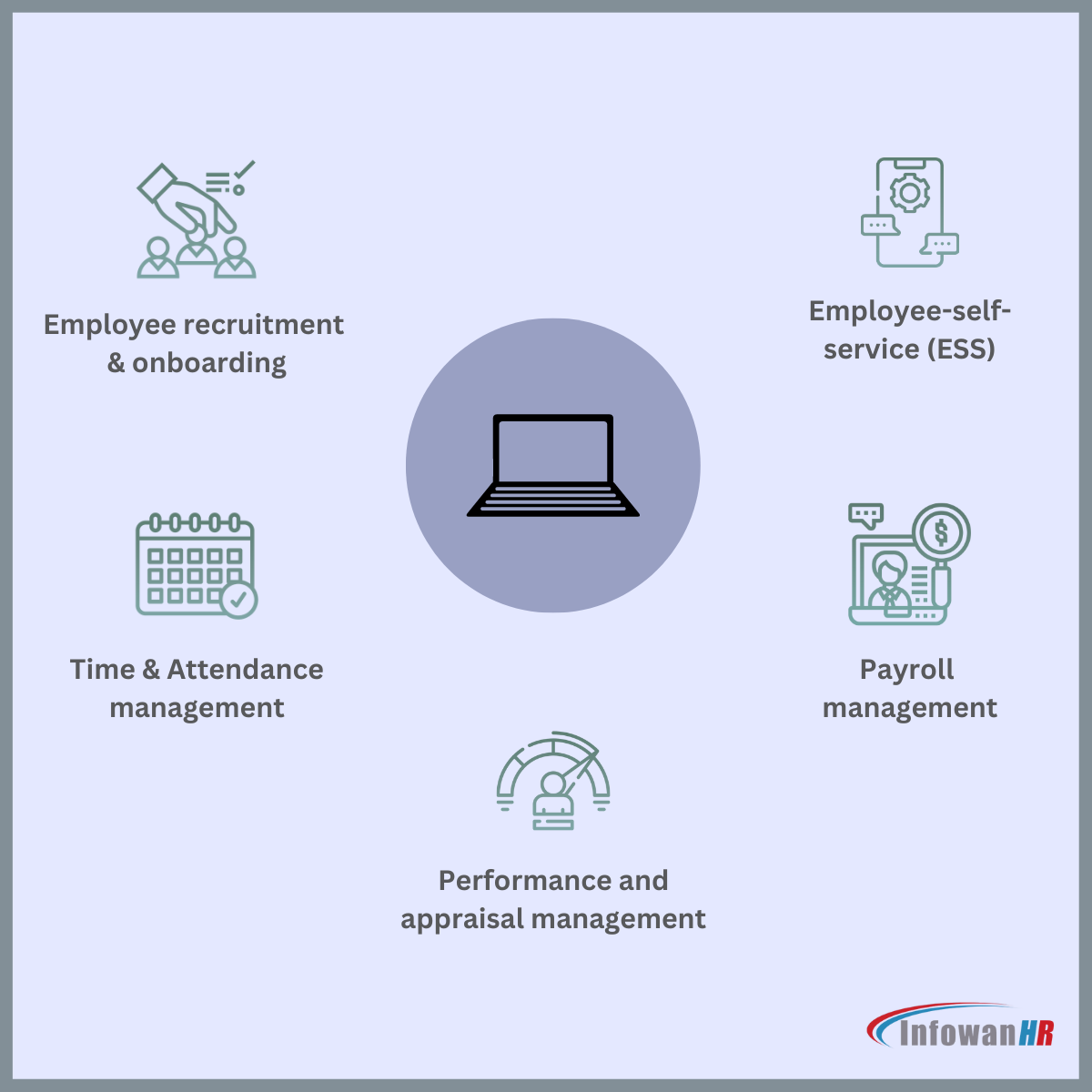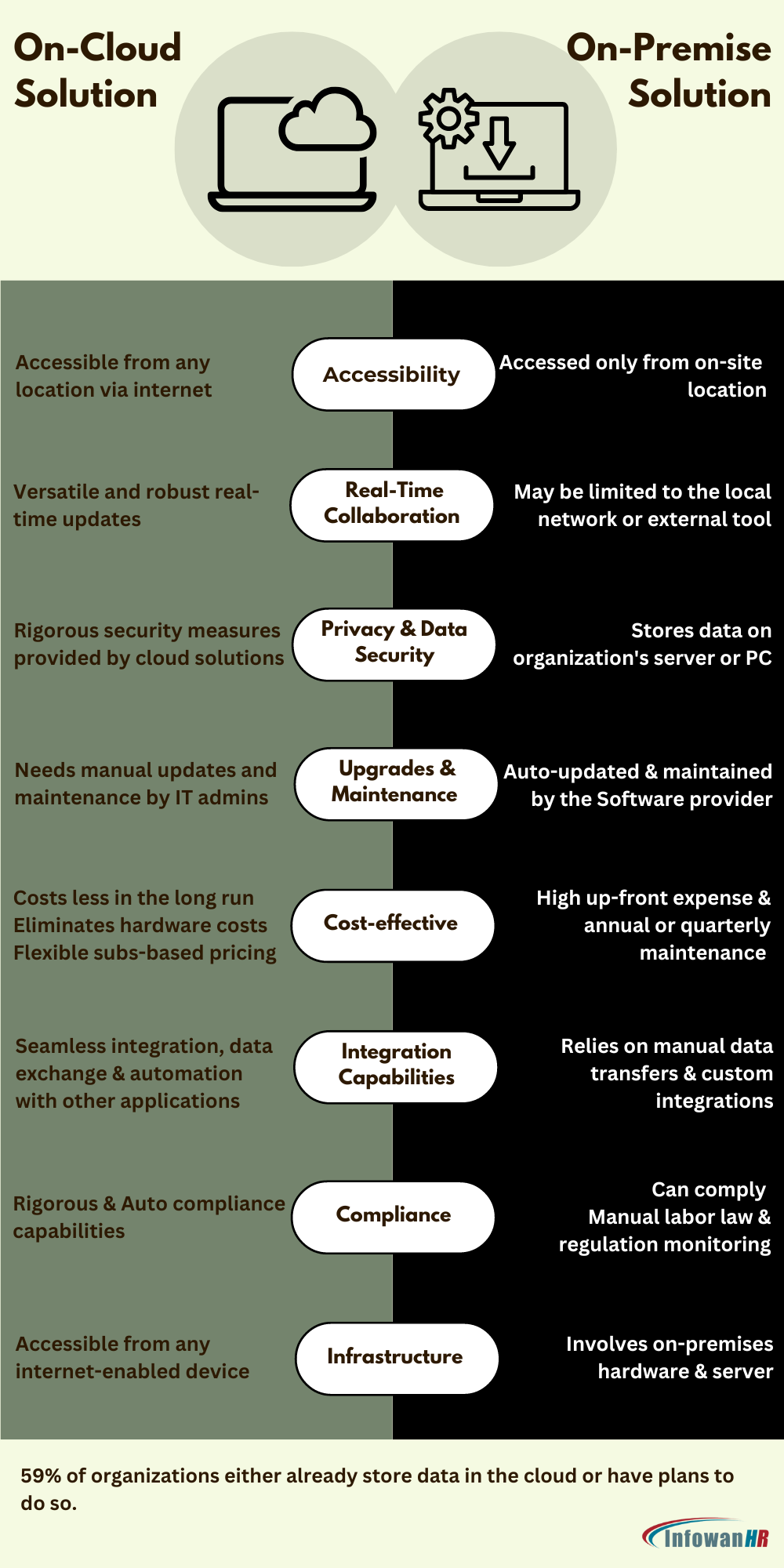
How can we help you today?
Registered Office
Infowan Technologies Pvt Ltd
Mumbai-401107. INDIA.
Contact Details
+91 98201 97205
+91 98201 26871
+91 98670 74415
support@infowan.net
info@infowan.net
|
Table of Contents
|
|---|
| Why shifting to cloud-based HRMS from on-premise desktop HRMS is important? |
| Core functions of HR software |
| On-premise desktop HRMS |
| Limitations of on-premise desktop HRMS |
| Cloud-based HRMS Software |
| Let's take a detailed look at the features provided by cloud-based payroll HR software. |
| Conclusion |


Locally hosted HRMS is a desktop software that is installed on each desktop or device associated with the organization and can be accessed via Intranet; a private network used to securely share the company's data and computing resources with employees.
To be more precise, On-premise desktop HRMS is installed and operated locally on a company's own servers and computers. This type of software is typically purchased as a one-time license and maintained by the company's IT department. It allows for greater control over the software and data, as well as the ability to customize the software to meet specific needs. However, it also requires a larger upfront investment in hardware and IT resources compared to cloud-based solutions.
Limitations of on-premise desktop HRMS:• On-premise desktop software is typically limited to the physical location where it is installed. It can be challenging for remote or distributed teams to access the services and HR data outside of the office premises.
• It becomes necessary for organizations to manually monitor and update the system to ensure ongoing compliance. Changes to labor laws, regulations, or compliance requirements may not be automatically incorporated into the desktop software.
• Hardware upgrades and additional licenses may be required to accommodate increased data and user usage.
• Since Desktop software relies on the organization's own IT infrastructure, ensuring robust data security measures and regular backups requires dedicated IT resources and may still expose the organization to major high-stakes risks and severe data threats.
• Collaborating on HR-related tasks can be challenging with desktop software, as real-time collaboration and data sharing may be limited compared to cloud-based systems.
Cloud-based HRMS SoftwareCloud-based HRMS software is a type of software that is hosted on remote servers and accessed through the Internet. This type of software offers many advantages over traditional on-premise desktop software, such as easier access, scalability, cost savings, and increased security. With cloud-based HRMS, organizations can streamline their HR processes, manage employee data more efficiently, and improve collaboration among HR teams. Additionally, cloud-based HRMS can provide employees with self-service options, such as accessing their pay slips and benefits information, which can save HR teams time and resources.

Large enterprises are adopting cloud-based human resource management software, which is also highly advantageous for small businesses due to its cost-effectiveness. It eliminates the need for expensive on-site hardware and IT infrastructure, reduces upfront and ongoing expenses, and offers a cost-effective subscription model. In addition, it provides high security and 100% automatic statutory compliance.
There is a growing number of businesses making the switch to cloud computing: The 15th Ernst & Young Annual Global Information Security Survey found that 59% of organizations already keep data within the cloud or are going to do so.
Let's take a detailed look at the features provided by cloud-based payroll HR software:Cloud-based HRMS can be accessed from anywhere with an internet connection, allowing HR personnel and employees to work remotely and access various features like attendance, timesheet, and tasks via mobile app or browser.
Encryption, firewalls, and monthly security upgrades are some of the rigorous security measures that credible cloud HRMS providers implement to protect sensitive employee data.
Cloud-based HRMS provider takes care of all system upgrades and maintenance chores, guaranteeing that the software is in perfect working order at all times and is always up to date.
An HRMS that is hosted in the cloud reduces the need for companies to invest in and operate their own hardware and infrastructure, which results in a reduction in both the upfront investment and the recurring maintenance costs.
An HRMS that is hosted in the cloud enables real-time collaboration and the sharing of data among the entire organization (employee, reporting manager, HR, etc), which in turn promotes effective communication and teamwork.
Cloud-based HRMS systems can often integrate with other applications, such as different job portals to centralize candidate shortlisting, employee benefits platforms, streamlining data exchange, and reducing manual data entry.
Cloud-based HRMS typically offers mobile apps or responsive web interfaces, allowing employees to employee service modules, and HR's can access core HR modules on the go.
ConclusionSwitching from a traditional desktop HRMS (Human Resource Management System) to a cloud-based HRMS can offer numerous benefits. Cloud-based HRMS allows for real-time data updates and accessibility from anywhere with an internet connection. This means that employees and managers can access important information and complete tasks remotely, which can increase efficiency and productivity. Cloud-based HRMS also eliminates the need for costly hardware and software upgrades, as well as reduces the risk of data loss due to system failures or disasters. Overall, making the switch to a cloud-based HRMS can lead to a more streamlined and cost-effective HR management process.